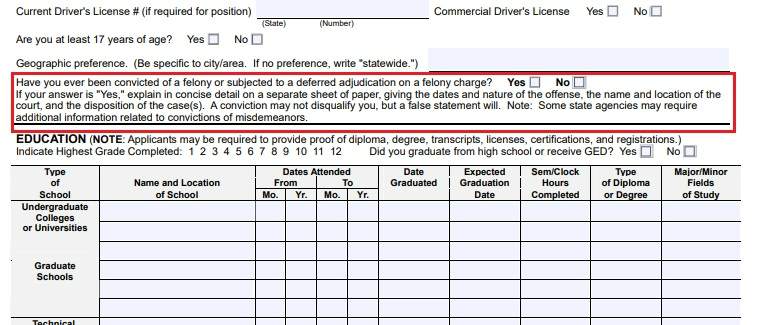A state Ban the Box law prohibits employers from asking about a candidate’s criminal history on a job application. Ban the box originally referred to a yes or no box on job applications that asked if a candidate had ever been convicted of a felony. This has since expanded to include questions about any criminal history, not just felonies, and has moved beyond the paper application to include anything asked on virtual questionnaires.

The “box” outlined in red on an employment application that asks about criminal history (Source: Texas Department of Criminal Justice)
The idea of a ban the box policy is to give every applicant a fair shot at getting a job when they’re adequately qualified, regardless of their criminal history. In that endeavor, many states and cities have enacted ban the box laws for private employers (there is no federal law on the matter). Our guide will help ensure your business complies with employment laws in your area.
History of Ban the Box
The ban the box movement, also referred to as “fair chance” or “second chance” laws, began in Hawaii in 1998. Minnesota followed suit soon after—and since then, dozens of states and many more cities and municipalities have enacted similar laws.
In 2012, the Equal Employment Opportunity Commission (EEOC) gave public support for ban the box legislation. The Fair Chance Act, which became effective in 2021, prohibits federal agencies and contractors from requesting criminal history information from applicants, with a few exceptions.
States With Ban the Box Laws
Lacking a federal law for private employers, 41 states, plus the District of Columbia, have established their own ban-the-box laws. Some laws apply to public sector employers only, but others also apply to private employers. Click on your state below to learn the ban-the-box law that is applicable to employers.
All these laws ban employers from asking for criminal history on applications or during the hiring process. Additionally, many of the laws have exceptions. For example, if a clean background is integral to the job, you may be able to ask applicants if they’ve been convicted of a crime. So, if you’re hiring a delivery driver, you can ask if they’ve ever been arrested and convicted of DUI. We recommend, however, that you speak with an employment attorney to ensure you’re following the law correctly.
Impact of Ban the Box Laws: What to Consider
There are employment and hiring laws you need to follow through the hiring and employment process to ensure compliance. If you’re a new employer or are hiring your first employee in an area with a ban the box law, then you and your HR team need to prepare.
Ban the Box Laws Frequently Asked Questions (FAQs)
No, at least not for private employers with no federal government contracts. If your company has federal government contracts, you may be required to adhere to federal agency ban the box laws. However, as more states and cities pass ban the box laws for private employers, be aware that a national law may come, which would supersede any state and local laws.
It depends on where the applicant is located. If an applicant lives in a state that has a ban the box law, you’re probably unable to ask about their criminal history until at least an interview has occurred.
Yes, but usually not until a formal job offer has been provided to the candidate. Background checks aren’t always a necessary part of the hiring process, but if your company considers the background screening necessary, make sure you’re following the applicable laws to make sure you’re running a compliant background check.
Fair chance is another way to describe ban the box laws, though many states have fair chance laws that extend to housing and other areas of public importance. Fair chance simply means providing employment opportunities for people with criminal records by giving them a ‘fair chance’ to find gainful employment.
Bottom Line
Ban the box laws have been around since 1998. While there’s no federal law yet for private employers, it’s crucial that you pay attention to where your company gets applicants. Some state and local laws may apply, even if you don’t have a business presence in that area.